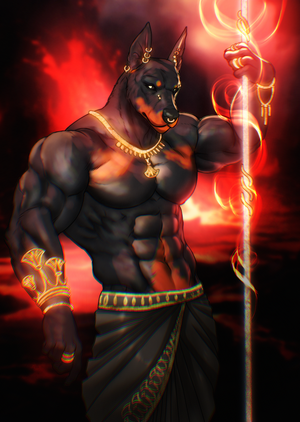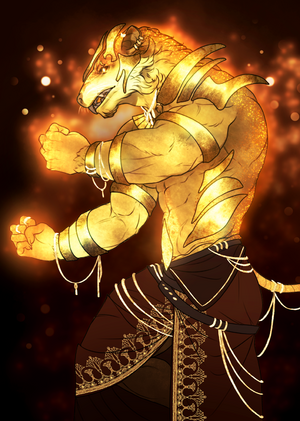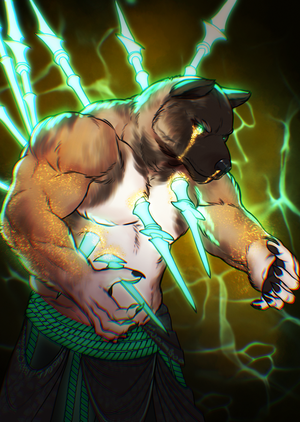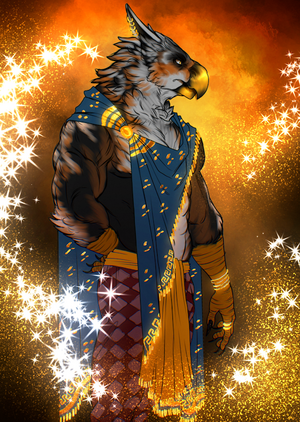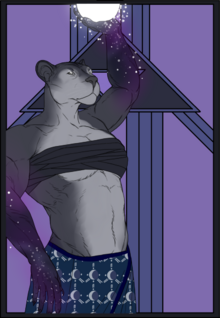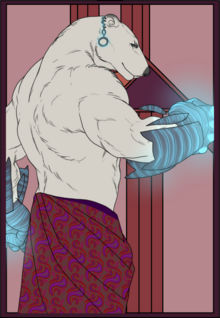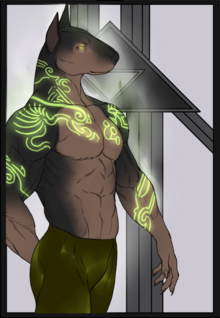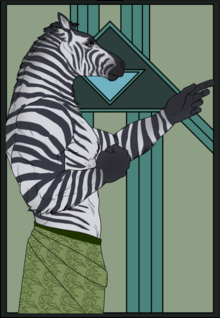Baskarr
| Baskarr | |
|---|---|
 | |
| Religion | |
| Pronunciation | Bas-Car |
| Origins | Dewamenet |
| Deities | |
| Subsects | |
| None | |
Origins
Baskarr, or the Faces of Baskarr as it is more commonly called, is a Religion primarily worshiped by the Asha and Feka Asha, dating back all the way to the Dewamenet Empire. As a result, Baskarr is one of the oldest, if not the oldest, continually worshiped religion for tens of thousands of years. However, because of the Dewamenet-Allorn War, and the subsequent enslavement of the Asha to the Allorn, it is generally assumed in the modern era that what is modern Baskarr is not the same as Dewamenet Baskarr, with aspects of the religion and nuances lost to time and Nelfin interference. The religion survived through word of mouth in enslaved communities, and after tens of thousands of years of separation, small differences and changes converged into new beliefs and concepts. As such, while it is perhaps the oldest continually worshiped religion, it is also an incredibly unstable religion that habitually experiences radical changes as ancient Dewamenet history and legacy is unearthed in the modern era.
Core Beliefs
Baskarr is a religion centered around the concept of Ma’at which is loosely translated to Karma in Common. Ma’at is the golden rule of the world to Baskarr, one that divines world order, peace, stability, hierarchy correctness and justice. The idea is that one will receive back what one does upon others, or that one will inflict back on others what has been inflicted on them. Everything that happens in the world to any person is deterministic because of what this person has done prior in their life, the sum of their actions, thoughts, emotions wants and needs, and how the Gods arbitrate this process. The term Baskarr itself means Origins in the old Dewamenet language. While Ma'at would imply a deep pacifist community, the Asha is anything but. The second core tenet of Retribution is a strong theme in their religion, though perhaps not in the way one would expect. Retribution to the Baskarr faithful is the idea of Justice, and enacting justice (no matter how violent, on for example the Elves) is a form of kindness and compassion to cleanse even non-believers of the stain of sin and tyranny from their soul. The injustices that Baskarr worshipers care most about, is slavery, genocide, and taking the lives of others, but they are also equally capable of condemning whole societies for the crimes of a few, and have this be justified in their religion. A person can make amends for evil deeds, or be inflicted retribution upon their soul by others, thus correcting any imbalances of sin and virtue. When a Soul passes to the Afterlife, which is called the Duat, the gods weigh the soul’s value against that of a feather, which is said to weigh near zero when it comes to Ma’at. Those who have sinned a lot have heavy souls, while those with good Ma’at have lighter souls, thus making the feather heavier. Those with heavy souls are rejected and sent back to Aloria, condemned to live the life of a diminutive animal before they may be reborn a second time into an Asha to try again. Even though they are burdened souls, repentance as a domestic or wild animal is considered holy repentance, and to kill such an animal is considered a grave crime against the Gods. Souls that are deemed light enough to stay in Dauat are given their own boat and sent sailing on the eternal ocean. It is said that the Dauat is an eternally calm ocean under a perfectly lit starry night sky, where the souls of those deemed worthy sail forever without need or want, and able to visit the boats of their friends and loved ones, as well as pets. Because pets go to the Dauat automatically (domestic animals cannot commit sins), it is believed that those who are condemned to be reincarnated as a dog or a cat will automatically pass to the Dauat once their repentance is up. Here is a list of all Holy Animals of the Baskarr Faith: Domestic Cats, Domestic Canines, Otters, Beavers, Horses, Rats, Rabbits, Mice, Ferrets, Deer, and Bears.
Divine Mechanics
All Religions provide 1 single Mechanic to their Believers that fits within the flair of their Religion. This Mechanic is lost if the individual stops believing in the Religion, or becomes a heretic, but can be regained. Afflicted can use this mechanic, but having the mechanic does not imply that they have blanket forgiveness from their Gods, just that there is more nuance to it than that.
- Baskarr Faithful (even if non-Asha) gain access to Living Metal (a liquid metallic substance that can imitate organic functions and be moved like water by its owner, or solidify in desired shapes), which is now capable of developing a will of its own. If they should die before it is their time (as arbitrarily dictated by the Gods), then their Soul and mind is transported into the Living Metal, which produces a whole new body for them out of Living Metal, which imitates their previous body, but in a more metallic form. Additionally, Living Metal can develop a will of its own while on their owner's body, and express sentiments or feelings independently of the owner's will, but will always subject to the owner's commands when given.
Gods and Goddesses
Baskarr has the so-called Faces of Baskarr. The Faces refer to each of the Gods, though at this point it is fairly clear that many of the Gods have been lost to time, and some Gods have been historically re-imagined. The new and modern re-discovered Gods are identified through the new format, while the old ones are present in the old God format.
Tjafar the Shaper God
| Description |
Tjafar is the King of the Baskarr Gods, the most powerful and the oldest one, and in some interpretations of old Dewamenet lore the ruler of the whole Empire as God-Emperor. Religious doctrine has it that Tjafar was killed at the end of the Dewamenet-Allorn War, but reborn in a massive explosive event in the reformed Allorn Empire, to resume the throne of King of the Gods, while not seemingly claiming the title of ruler of all Asha. Tjafar is the Shaper God, or the maker of all things mechanical and living-yet-unliving. He is the source of all Living Metal, and through the Baskarr-worshiping spiritual connection, allows the faithful to see him and his glory. Tjafar is the patron of any in command, any who seek and retain power, and those who consider themselves engineers and technicians. Because of the massive loss of Baskarr heritage (and Asha Heritage), Tjafar frames much of his work in attempts to revive machines of old, and to rediscover the lost treasures of the past. While as a reborn God he has wisdom of the past, due to his extended period of lifelessness, he has no memory or experience of the past 20,000 years, and as such, relies on the other Gods to aid him in his quest to restore the Dewa. | |
| Virtues |
To Tjafar, it is a virtue to first know one's place in one's immediate hierarchy and to not cause chaos and unrest. To the lower-class Baskarr believers, this means virtue in obedience and loyalty to military leaders and the Royals of the states, but also to fit in with any society that respects and allows the Baksarr faithful in it to flourish. It is virtue to seek out those who would raise up the Baskarr faithful to become the best version of themselves and to enable them to create a better world for them. Furthermore, virtues to Tjafar are the creation of machinery, the good-natured and good-faith usage of Living Metal, and a desire to help, shelter, or encourage each other to reach greater levels of self-actualization. One can find all the good qualities of leadership in his virtues. | |
| Vices |
To Tjafar, vices are all the traits opposite of what one would expect from a good leader. The greatest sin in the eyes of Tjafar is to be a bad, lazy, or ineffective ruler, and to hold onto the lick of power without any legitimacy or claim to the betterment of others. In a contradiction of his own patronage, Tjafar considers the act of desiring to be a leader to be prideful and greedy, while attaining leadership by popular consensus or compromise is considered a good thing. In his doctrine, good leaders are chosen and brought into the role, not seized by means or hungered for power, because this hunger quickly turns from ambition and drive, into self-centered blindness in a never-ending struggle to hold onto power. For Tjafar, leaders must know when their time has come. | |
| Relations |
As the King of the Gods, Tjafar was the first born according to religious doctrine. He is the older brother of Akhet the Golden God, and the father of Khannar the Vengeance God and Wadjat the Infinity God. Nehet is his daughter-in-law due to her marriage with Akhet. There are other relations to the other Baskarr Gods as they are all held to be related to one another, but due to the loss of history and information, it is impossible at the current point in time to establish his relation to Divi and Ra'mut, or the other unknown Gods. |
Akhet the Golden God
| Description |
Akhet is the War God equivalent of the Baskarr faith, but he is so much more than that. For thousands of years, he was called the Reclaimer, one of the last living Baskarr Gods who tried to make sure that the seedling of Baskarr faith remained so that the Gods would also keep existing. When reviewing his brother Tjafar as the King of Gods, Akhet can be considered the General of the Gods, the leader of the military forces of the Dewamenet Empire, and the right-hand of Tjafar to execute his will on both the people and the enemies of Baskarr. While being primarily a War God, he is also the physical embodiment of the Sun to the Baskarr Faithful, in contrast to his wife Nehet who represents the Moon. Their marriage is not loveless, but without passion, as Nehet is singularly minded in her chastity, while Akhet is singularly minded in his hedonism. Akhet commits acts of infidelity by permission of Yah, and has sired many Godborn from mortals over the millennia called the Golden Reclaimers, exceptionally powerful Godborn who were born in his image, and aid in the protection of the Baskarr Faithful from particularly Elves. Because of his hedonism, Akhet is simultaneously a God of plenty, fertility and pleasure. | |
| Virtues |
Akhet's greatest virtue is physical fitness and bodily health, and all the expectations that come from this. Akhet demands that the body made in the Faith of Baskarr is one that is cherished and well taken care of, and that a body and mind must flourish for two simple reasons. A body that is fit, is suitable and built for war, and a body that is fit, is attractive and desired in passion. A mind that is untroubled, is suitable for strategy, and a mind that is untroubled, is capable of expressing and appreciating all the luxuries and pleasures of life. While military prowess is also virtue to Akhet, it is far less pronounced, because Baskarr Faith is not a military-focused religion, but generally standing up for the faithful and protecting them from harm is also good. | |
| Vices |
Akhet's Vices are obviously the neglect of one's own body by over-indulgence in consumption of food, or to live life restrained by the presentability politics of other societies and people. This is less a derision of the idea of subjecting to someone else's limitations, but rather an encouragement to find ways to apply fusions to anything the faithful engage in. This for example covers the idea that the faithful should not alter their dress style away from what they are comfortable with for others, or that they should not change their behavior so fully to please others, and that in both cases they should seek to harmonize their natural state and preferences, and conformity to others for the sake of order and pragmatic approach. Obstinacy or submission as extremes are in such a case a sin. | |
| Relations |
Akhet is only directly related to Tjafar being his younger brother, and married to Nehet which is described as a marriage full of love and respect for one another, but without the hedonistic pleasures Akhet lusts for. Akhet has a large extended family of Golden Reclaimers, however. These are Godborn who are born in his image with golden metallic fur, who grow much larger and stronger than even the most average of Godborn, and frequently become champions or warlords in their own right on the frontline of conflict. |
Khannar, the Grieving God
| Description |
Khannar is the God of Vengeance, who was once the God of Music and Art and all things Dewamenet. It was said that his music could soothe the raging hearts of the most troubled, and his divine inspiration moved even the other Gods to tears when war raged in the heavens, something that would occur when Wadjet schemed against his father Tjafar. Khannar was the peace bringer of the ancient Dewamenet, but also the first to feel the sting of loss. He was the second God who was killed in war, when the Goddess Cemaan of Estelley led her Golden Host to impale and kill him and Khannar's wife on a thousand cursed spears. His wife's name was lost to time, or even what she was the God of, but in his death, Khannar's rage became so strong that it somehow broke into the Beyond, and stole power from the Malefica to break back into the world of the living. Khannar is now a God somewhere between life and death, still impaled by the spears of the Golden Host, but warped by Ordial powers that are bent for revenge. His single purpose now, is to exact vengeance and violence on the Elves for the murder of his wife and his people, as he can no longer hear music, or see art in blind rage. | |
| Virtues |
Khannar's virtues are cruel, and therefor not often followed by the faithful. He demands the death of all Elves as a blood price to pay for the death of hundreds of millions of Asha, and complete cultural eradication. Khannar is not a God of mercy, and considered the next of kin, and the tenth or hundredth generation of Elves just as guilty as the first. He only accepts complete submission and collaboration from the Elves as passage to forgiveness, even if he cannot give it himself. There is still a small spark of his old self present, in that lesser virtues of his work is to cherish and love any little moments or time one can find with one's family and lovers, because in his eyes the world and fate is too cruel to bear even for Gods. | |
| Vices |
While Khannar's vices are difficult to avoid, as they all relate to either forgiving or showing apathy to the revenge to be exacted upon the Elves, the faithful apply a more nuanced approach. It is an absolute sin to ignore or forgive the Elves who refuse to stand with the remnants of the Dewamenet, but vengeance does not have to express itself through murder alone. Many Baskarr faithful apply a healthy dose of skepticism, derision, exclusion, paranoia, mistrust, or disdain towards the Elves. In the eyes of Khannar, to make friends or worse to make love to Elves is a deep sin, but revenge can be satisfied even in small acts of rebellion and discomfort inflicted upon the Elves, so long as the faithful are obstructionist at the very least. | |
| Relations |
Khannar is the husband of an as-of-yet-forgotten Baskarr Goddess and the son of Tjafar. This also makes him the brother-in-law of Hemnetjeret, as he is the brother of Wadjet. Khannar surprisingly also has a decent number of Godborn however. One would not expect the God of grief and vengeance to have offspring, but perhaps in some way to cope with the loss of his wife and happiness, falls in love with Asha who some theologians claim remind him of his wife. This means that Godborn of Khannar are often entirely accidental, unlike Akhet's who are born with purpose. |
Divi, the Humble God
| Description |
Divi is the God of humility and wealth at the same time. He represents the idea that when one is content in life with one's material possessions and station, one is very wealthy in happiness. Inversely, he represents the idea also that if someone is exceptionally wealthy and has access to everything and anything, that one is poor in life lessons and wisdom to navigate life's challenges. Because of his aim towards happiness with these ideas, he is sometimes also referred to as the Happiness God. His traits also gravitate towards pacifism and acceptance, especially a vow of non-hostility which puts his ideology at odds with Khannar who wishes for the extermination of all Elves who do not kneel to his grief. Divi is also referred to as one of the Objector Gods, Gods who refused to take part in the Dewamenet-Allorn War, and left the Empire to crumble. Divi took the Savent Asha with him to Fendarfelle, and lived out the collapse and later millennia away from violence. Because of this and due to the pacifist nature of those who hold him as their patron, he is sometimes worshiped less, or even outright derided as a God for weaklings among those who believe in the Reclamation. | |
| Virtues |
Virtues to Divi are all the good qualities of a person. These include but are not limited to: kindness, charity, compassion, mercy, non-violence, honesty, temperance, trustworthiness and empathy. It is virtue to Divi to share all the fortunes of live and to give away as much as is feasibly possible, while it is also virtue to soothe the anger of the Khannar Godborn or those faithful who hold Khannar's patronage, so as to prevent the world at large from seeing all the faithful as murderous zealots incapable of mercy. Finally, to add more context, Divi's greatest virtue is the so-called Peace Vow. A Peace Vow involves a Vow never to inflict harm on any other living being, and to seek higher self-awareness through liberation from anger. | |
| Vices |
Vices to Divi are all the bad qualities of a person. These include an extensive list of the opposites of the virtues mentioned above, and more. However, for Divi, sin is not only to have or express these poor qualities, but also to suffer them from others or to permit other faithful of Baskarr to express them without restraint or remorse. There is one curious exception to Divi's strong pacifist or non-violent lean: Divi strongly encourages the faithful to battle the corrosive influences of the Void Arken and Exist Arken alike. To Divi, even if an Arken represents Justice or Compassion, these are toxic interpretations of good natures. To Divi, it is sin to stand by and watch as the Arken corrupt the malleable souls and hearts of mortals. | |
| Relations |
Divi's relations to the other Baskarr Gods is incredibly unclear, because the existence of the Savent Asha has long been disconnected from the other Asha people and societies in which they reside. Furthermore, it is known that Divi does not have a direct relation to Tjafar who is seen as the anchoring point for all the other Baskarr Gods, but that he is likely focused around some of the currently unknown Gods, or possibly Ra'mut. Divi is the only Baskarr God who lives nearly permanently among mortals in Fendarfell, and provides secular rulership and spiritual guidance to them. |
Yah, Lady of the Heavens
|
Ankh, Hands without Forgiving
|
Wadj, Gaze upon Infinity
|
Ra’mut, Guidance of Wayfarers
|
Priesthood
Baskarr does not have a priestly hierarchy like Unionism or Estellon, but that does not mean it has no priests at all. Rather, priests are called Diviners, because their task is not so much to preach, but to try and interpret the life-signs or words of the Gods provided to the faithful. While many faithful could live their whole lives without seeing a God once, the actions of the gods can still be interpreted in the world around them. Furthermore, Baskarr Diviners offer social services, a form of therapy for those who have had evil actions inflicted on them, but also to offer advice on how to enact retribution, or practice forgiveness, depending on what the person seeking help wants. To become a Baskarr Diviner, one does not need any formal training, one simply decides to be one. It is usually required however for the Diviner to wear the Satoor in exact design of the god or goddess they primarily represent, with Wadj having some more freedom (or, if the person refuses to wear Elastan, to wear a pure-black Satoor). Baskarr Temples are also fairly informal because worship is a more personal arrangement. Still, a matter of public acknowledgement of the gods has some value, and as such, shrines with statues of the Faces can be found in all major Asha population centers.
Trivia
- The Faces of Baskarr have the misfortune of frequently being misgendered by outsiders due to their large-leaning physical appearance, and because some of them have gender identities different than their appearance, or because they take more appearance traits of the opposite gender.
- It is well understood that a lot of the nuance of the faith is not understood because the pantheon is incomplete. It is for example possible that the relation between Akhet and Yah is very different, if Yah’s husband god was supposedly found. Many Baskarr faithful disregard this potential reality for now, under the assumption they will correct their beliefs when new information is brought to light.
- There is a constant information war going on between the Allorn Empire and the Ashal States. The Ashal States fund research and excavations into historical sites, but Estellon fundamentalists are well known to enact acts of terrorism on these historical sites as a continuation of erosion of Asha identity. The Allorn revanchists benefit from mitigating Asha nationalism, as millions of Asha are still enslaved in the Allorn and Dread Empire.
| ||||||||||
| Accreditation | |||||||||
|---|---|---|---|---|---|---|---|---|---|
|
| ||||||||
